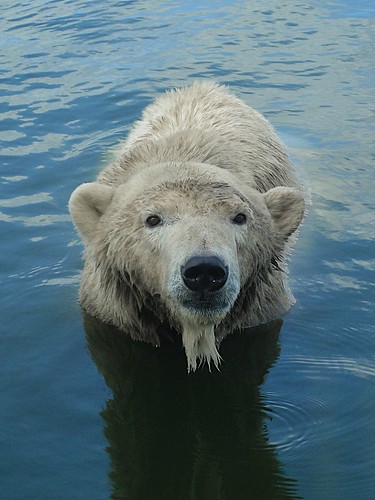
Polar Bear. Image originally uploaded by ironmanixs
You might remember that Al Gore was accused of alarmism, exaggeration, and even outright lying in his film "An Inconvenient Truth". Fox News and other right wing critics giddily published columns with titles like "Convenient Untruths" after a British judge decided there were 9 significant errors in the film.
The Washington Post's Fact Checker also focused on that decision on the day that it was announced that Gore had received the Nobel Peace Prize for his work on climate change.
[T]he judge described Gore's film as "broadly accurate" in its presentation of climate change. At the same time he also listed nine significant errors in the movie which, he said, reflected a general context of "alarmism and exaggeration" surrounding climate change.These 9 significant errors rapidly dropped to 3 errors or omissions once the Fact Checker bothered to ask people who actually understood the science.
By the Gore camp's own admission, some scenes in the movie have been over-simplified. As Kreider points out, science does not transfer easily to the big screen. Scientists sympathetic to Gore have effectively conceded several errors or omissions in the movie:Among the remaining errors Fact Checker listed was this:
Drowning polar bears. Gore cited a scientific study showing that polar bears had drowned by "swimming long distances--up to 60 miles--to find the ice." According to Andrew Derocher, chair of the polar bear group at the World Conservation Union, studies show that there is a good chance that the polar bears died by drowning but no definitive proof. Storms and hypothermia are other major concerns.Well the science is rapidly coming down on Gore's side of the argument:
A census of polar bears in Canada’s Hudson Bay has lent some hard numbers to the long-held fear that retreating sea ice is causing some bears to starve or drown.The Fact Checker's last column on the debate ended with this line:
Now, looking at 20 years of data from bears captured along the coast of Hudson Bay, a team of scientists from the United States and Canada has found that fewer of the youngest and oldest bears survived in years when the ice broke early.
“Survivorship has dropped in the cubs, subadults and very old animals and is directly related to the date of break-up,” says Ian Stirling, a biologist with the Canadian Wildlife Service in Edmonton, Alberta, and an author on the report.
In their zeal to draw attention to the cause, even Nobel peace prize laureates can make mistakes or shade the truth a little. I award Al Gore one Pinocchio.I'll leave it to the reader to decide whether the Fact Checker was being too zealous in its attempt to be "evenhanded" in the global warming debate.
No comments:
Post a Comment